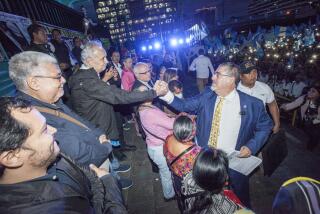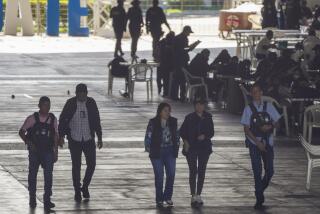U.S. ‘Ink’ Slows Start of Honduras Vote
- Share via
TEGUCIGALPA, Honduras — The U.S.-backed presidential elections got off to a rocky start here Sunday with confusion at polling places over American-supplied “ink” used to mark the pinky finger of each voter.
Hondurans customarily are required to dip a finger in red ink after casting their ballots as a measure to prevent multiple voting. But when election workers set up their polling places Sunday, they found unfamiliar jars of clear silver nitrate rather than ink, and, suspecting fraud, refused to allow the voting to begin.
“Look, they have given us pure water,” said America de la Rocha, a poll worker at the Vicente Cacares School here. “It doesn’t smell and it doesn’t change color. I am not letting them vote.”
The National Election Tribunal cleared up the problem about 7 a.m.--an hour after polls should have opened--by explaining by radio that the silver nitrate was the indelible ink that would turn black when exposed to sunlight.
The final election results are not expected until today. A Spanish International Network pre-election poll showed Rafael Leonardo Callejas, 42, candidate of the opposition National Party, in the lead with 44% of the votes, followed by Jose Azcona Hoyo, 58, of the ruling Liberal Party, with 30%.
But there has been much controversy over how the winner of the election will be determined. The constitution says that the candidate with a simple plurality wins, but a recent electoral law says that the winner shall be the candidate with the most votes from the party with the most votes.
The network’s poll showed Azcona’s Liberal Party, with four presidential candidates on the ballot, leading with 49% of the vote, and Callejas’s National Party, which is running three candidates, with 46%.
The Election Tribunal, after being prodded for a decision on the controversy by the military, by the U.S. Embassy and by the candidates themselves, finally announced late Saturday that it will certify the winner according to the new electoral law.
But if the network poll is accurate and the presidency goes to Azcona, Callejas’s National Party is expected to challenge the outcome before the Supreme Court as unconstitutional.
The Election Tribunal extended voting for an hour past the usual 5 p.m. deadline because of the morning delay over ink.
The U.S. government, which considers Honduras its democratic ally and partner in regional policy, spent $900,000 on the election, including the provision of the silver nitrate, chosen by the Agency for International Development because it is considered foolproof.
Honduras has a history of military coups and fraudulent elections, and the U.S. Embassy here has been trying to guide this one to completion. The election should result in the first transfer of power from one elected civilian to another since 1929.
“The emphasis was on indelible,” embassy spokesman Michael O’Brien said. “Everyone was worried about the problem that ink would wash off. Silver nitrate is essentially foolproof. Once you put it in the light, it colors in five minutes.”
O’Brien explained that the silver nitrate may not have shown up on fingers initially because the early morning sunlight was not strong enough to activate the color, or because the people testing it may have had dirty fingers.
O’Brien said that poll workers were given instructions on how to use silver nitrate but apparently did not read them.
More to Read
Sign up for Essential California
The most important California stories and recommendations in your inbox every morning.
You may occasionally receive promotional content from the Los Angeles Times.










